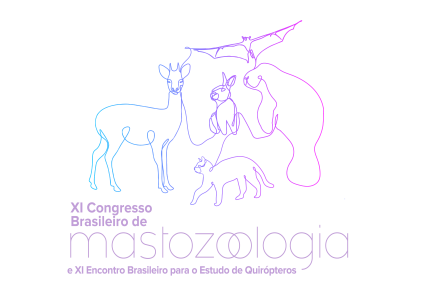Dados do Trabalho
Título:
GENETIC DIVERSITY OF BARTONELLA SPP. IN SMALL MAMMALS FROM ACRE, WESTERN AMAZON, BRAZIL
Resumo:
Bartonella is a genus composed of Gram-negative, facultative intracellular bacteria, which have tropism for mammalian erythrocytes and endothelial cells, causing a wide spectrum of human diseases. Although Bartonella can be identified in livestock and synanthropic animals, the greatest diversity of species is found in wild small mammals, rodents and bats, respectively. The study aims to evaluate the occurrence and genetic diversity of Bartonella spp. circulating in rodents (R), marsupials (M), and bats (B) in forested areas under different anthropic pressures in the state of Acre. The study was conducted in six locations between 2015-2019: four forest fragments and two areas of continuous forest located in the eastern region in the Purus River basin of the state of Acre: Chandless State Park (R,M,B), Seringal Cachoeira (R,M); Forest of the Roberval Cardoso School (FERC:R,M,B); Zoobotanical Park (PZ:R,M,B), Chico Mendes Environmental Park (PACM:R,M,B); Humaitá Forest Reserve (RFH:R,M). Samples of the liver and spleen were obtained and the DNA was extracted. The PCR was performed for genes gltA (720bp), ftsZ (791bp), groEL (800bp), and the phylogenetic analysis was performed with the Geneious program using maximum likelihood/Bayesian inference as phylogenetic support. A total of 309 animals were captured, including 127 rodents, 104 marsupials, and 78 bats. The largest number of specimens were captured in the fragments forest (158), including 57 rodents, 67 marsupials, and 34 bats. The DNA of Bartonella spp. was amplified from target genes in: nine bat species Anoura caudifers (1), Artibeus planirostris (1), Artibeus lituratus (2), Carollia perspicillata (3), Carollia brevicauda (1), Myotis riparius (2), Phyllostomus elongatus (1), Trachops cirrhosus (1) Uroderma bilobatum (1); five rodent species: Proechimys gardneri (2), Neacomys spinosus (1), Euryoryzomys macconnelli (1), Hylaeamys yunganus (1), Rhipidomys gardneri (1) and one marsupial species, Marmosops ocellatus (1). The Order Chiroptera was the most diverse with the highest incidence (0.18),d in Order Rodentia the incidence was moderate (0.04), and in marsupials the incidence was low (0.01). Phylogenetic analysis showed genotypes of Bartonella vinsonii complex associated with bats and rodents circulating in Acre, mainly in the species Euryoryzomys macconnelli, Neacomys spinosus, Rhipidomys gardneri, Artibeus lituratus, and Uroderma bilobatum. The genotypes found in Proechimys gardneri, Marmosops ocellatus, and Hylaeamys yunganus were grouped with the species Bartonella birtlesi and B. alsatica. Two genotypes did not group with any species of Bartonella, the first found in two specimens of Myotis riparius and the second in two specimens of Artibeus planirostris. The B. vinsonii complex is the most prevalent in rodents and bats in Brazil and its distribution was expanded to Western Amazonia. This is the first record of a marsupial with Bartonella DNA described for the Amazon region, and also the first genotypes associated with new species of Bartonella. The presence of Bartonella genotypes not yet related to a specific group suggests that the diversity of these bacteria is still underestimated. Our results corroborate bats as a host group susceptible to Bartonella occurrence, and they can act as a bridge to the spillover of new pathogens in wildlife-livestock-human interfaces.
Keywords: Amazon; Bartonella spp.; wild mammals
Financiamento:
Área
Genética
Autores
Jonathan Gonçalves-Oliveira, Bernardo Rodrigues Teixeira, Elvira Dominique Freitas, Rair Sousa Verde, André Luis Botelho, Charle Ferreira Crisóstomo, Matheus Ribeiro Assis, Luciana Santos Medeiros, Cibele Rodrigues Bonvicino, Paulo Sérgio D’Andrea, Shimon Harrus, Elba Regina Sampaio Lemos
